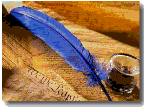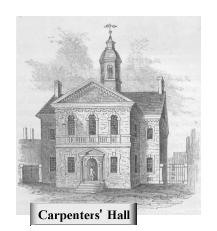
The Declaration of Independence
When in the course of human events . . .
First Continental Congress
Proceedings of the First Continental Congress

Carpenter's Hall
The first Continental Congress met in Carpenter's Hall in Philadelphia, from September 5, to October 26, 1774. Carpenter's Hall was also the seat of the Pennsylvania Congress. All of the colonies except Georgia sent delegates. These were elected by the people, by the colonial legislatures, or by the committees of correspondence of the respective colonies. The colonies presented there were united in a determination to show a combined authority to Great Britain, but their aims were not uniform at all. Pennsylvania and New York sent delegates with firm instructions to seek a resolution with England. The other colonies voices were defensive of colonial rights, but pretty evenly divided between those who sought legislative parity, and the more radical members who were prepared for separation. Virginia's delegation was made up of a most even mix of these and not incidentally, presented the most eminent group of men in America. Colo. George Washington, Richard Henry Lee, Patrick Henry, Edmund Pendleton, Colo. Benjamin Harrison, Richard Bland, and at the head of them Peyton Randolph — who would immediately be elected president of the convention.
The objectives of the body were not entirely clear but, with such leadership as was found there, a core set of tasks was carried out. It was agreeable to all that the King and Parliament must be made to understand the grievances of the colonies and that the body must do everything possible to communicate the same to the population of America, and to the rest of the world.
The first few weeks were consumed in discussion and debate. The colonies had always, up to this time, acted as independent entities. There was much distrust to overcome. The first matter to be considered by all was A Plan of Union of Great Britain and the Colonies, offered by Joseph Galloway of Pennsylvania. The plan was considered very attractive to most of the members, as it proposed a popularly elected Grand Council which would represent the interests of the colonies as a whole, and would be a continental equivalent to the English Parliament. Poised against this would be a President General, appointed by the crown, to represent the authority of the king in America. Conflict in Boston overcame the effort at conciliation. The arrival of the Suffolk County (Boston) resolves just prior to the vote on the Plan of Union, caused it to be discarded by a narrow margin.
On October 14, the Declaration and Resolves established the course of the congress, as a statement of principles common to all of the colonies. Congress voted to meet again the following year if these grievances were not attended to by England.
Several days later, on the 20th, came The Association, which was patterned after the Virginia Association and others that followed. This was a pact for nonimportation of English goods, to establish mechanisms throughout the colonies to enforce and regulate the resistance to Great Britain, and to keep the channels of communication open. It was to become effective on December 1, 1774 unless parliament should rescind the Intolerable Acts.
Delegates
| New Hampshire: | John Sullivan, Nathaniel Folsom |
| John Adams, Samuel Adams, Thomas Cushing, Robert Treat Paine | |
| Rhode Island: | Stephen Hopkins, Samuel Ward |
| Connecticut: | Eliphalet Dyer, Roger Sherman, Silas Deane |
| New York: | Isaac Low, John Alsop, John Jay, Philip Livingston, James Duane, William Floyd, Henry Wisner, Simon Boerum |
| New Jersey: | James Kinsey, William Livingston, Stephen Crane, Richard Smith, John De Hart |
| Pennsylvania: | Joseph Galloway, John Dickinson, Charles Humphreys, Thomas Miffin, Edward Biddle, John Morton, George Ross |
| Delaware: | Caesar Rodney, Thomas McKean, George Read |
| Maryland: | Matthew Tilghman, Thomas Johnson, William Paca, Samuel Chase, Robert Goldsborough |
| Virginia: | Peyton Randolph, Richard Henry Lee, George Washington, Patrick Henry, Richard Bland, Benjamin Harrison, Edmund Pendleton |
| North Carolina: | William Hooper, Joseph Hewes, Richard Caswell |
| South Carolina: | Henry Middleton, Thomas Lynch, Jr., Christopher Gadsden, John Rutledge, Edward Rutledge |
Start page | The Document | Signers | Related Information | Jefferson's Account | Declaration House | Declaration Timeline | Rev. War Timeline | More Resources |





